Unlocking the Future: The Importance of E-Commerce for Diamond Jewellery Brands

The diamond jewellery industry is embracing e-commerce for growth, as demonstrated by brands like Tiffany & Co., Cartier, De Beers, and Blue Nile, along with the drastic sales increments seen within the first year of implementation.
1. Cartier : 67% increase in online sales after implementing the eCom Solution in 2021

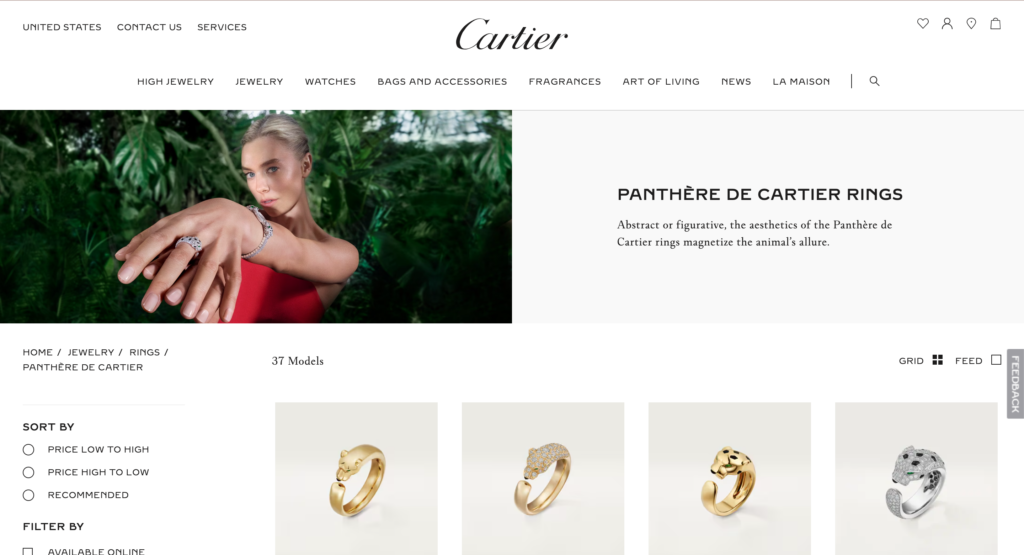
Cartier (https://www.cartier.com/en-us/home ), a part of the Richemont Group, Parisian luxury jewellery brand established in 1847, is celebrated for its impeccable craftsmanship and enduring designs. Synonymous with elegance and sophistication, Cartier offers a diverse range of high-end jewellery, watches, and accessories coveted by discerning customers globally witnessed an impressive 67% increase in online sales in 2021.
This success was driven by Cartier’s commitment to digital innovation and expanding its e-commerce presence. [Richemont Annual Report 2021]
Key Strategies:
- Augmented Reality (AR) Technology: Cartier implemented AR technology, allowing customers to virtually try on jewelry, thereby enhancing the online shopping experience.
- Market Expansion: The brand expanded its e-commerce presence in key markets like China and the United States, reaching a broader audience and driving significant sales growth.
- Website Enhancement: Significant improvements to the website’s functionality and design made it more engaging and user-friendly.
Cartier’s strategic embrace of digital transformation positioned it at the forefront of luxury retail.
2. Blue Nile: 45% surge in sales in 2020

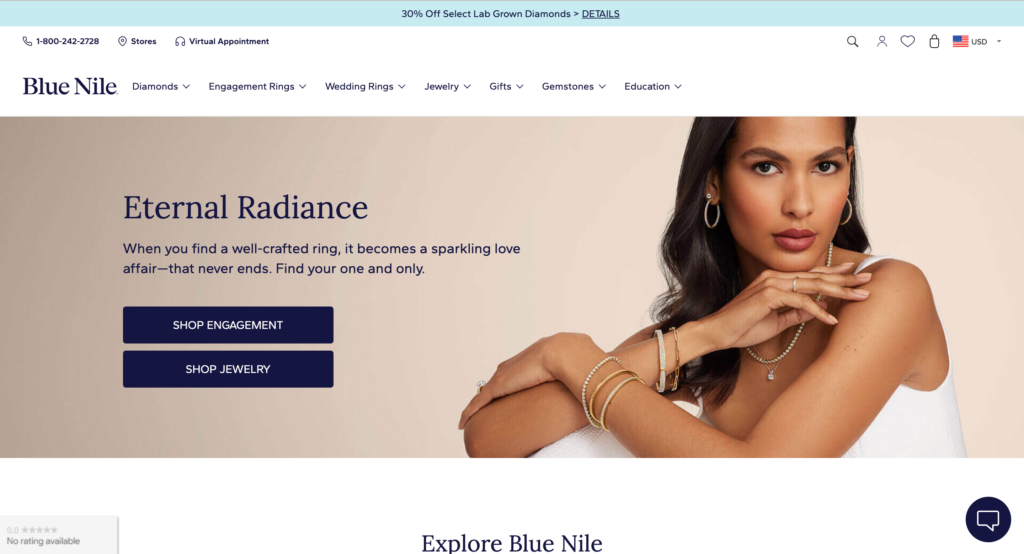
Blue Nile ( https://www.bluenile.com/), a pioneer in the online diamond retail space and also a premier online destination for exquisite diamond jewellery, renowned for its vast selection, exceptional quality, and value. As a leader in the online jewellery industry, Blue Nile offers a seamless shopping experience, providing customers with access to a wide range of diamonds, engagement rings, wedding bands, and fine jewelry pieces. saw a 45% surge in sales in 2020. [Blue Nile Annual Report 2020 ] Known for its innovative approach, Blue Nile set a standard for e-commerce in the jewellery industry.
Key Strategies:
- Virtual Shopping Tools: Blue Nile enhanced its virtual shopping tools, allowing customers to view and compare diamonds easily, making informed purchasing decisions.
- Expanded Product Selection: The company expanded its selection of diamonds and jewelry, catering to a wider range of preferences and budgets.
- Improved Customer Service: Blue Nile focused on improving customer service, offering detailed guidance and support throughout the buying process.
These efforts helped Blue Nile maintain its leadership in the online diamond market.
3. De Beers: 30% increase in online sales from 2019 to 2020

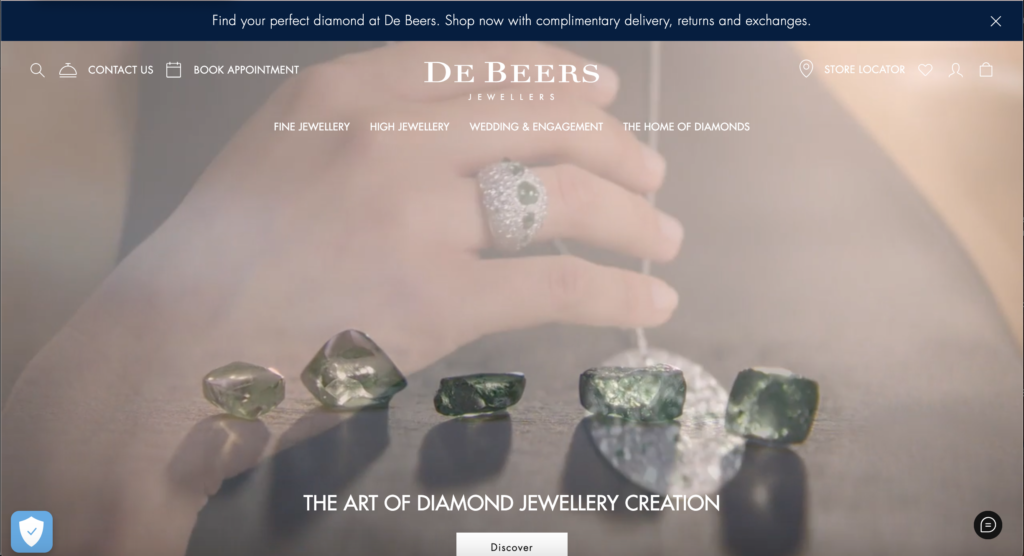
De Beers (https://www.debeers.co.uk/en-gb/home) is a prestigious name in the world of diamond jewellery, renowned for its unparalleled craftsmanship and timeless elegance. With a legacy dating back to 1888, De Beers has become synonymous with luxury and sophistication, offering a captivating range of diamond engagement rings, wedding bands, and exquisite jewellery pieces.
De Beers recorded a 30% increase in online sales from 2019 to 2020, highlighting the effectiveness of its omni channel strategy. The brand leveraged both digital and physical channels to provide a cohesive shopping experience.
Key Strategies:
- Digital Footprint Expansion: De Beers expanded its digital presence, particularly through its Forever mark brand, launching new collections online.
- Omni channel Integration: The company integrated its online and offline channels, providing a seamless and unified shopping experience.
- Exclusive Online Products: Offering exclusive products online drove more traffic and sales through its e-commerce platform.
By successfully merging digital and physical retail, De Beers enhanced customer engagement and boosted sales.
4. Tiffany & Co.: Significant 15% increase in online sales in 2020

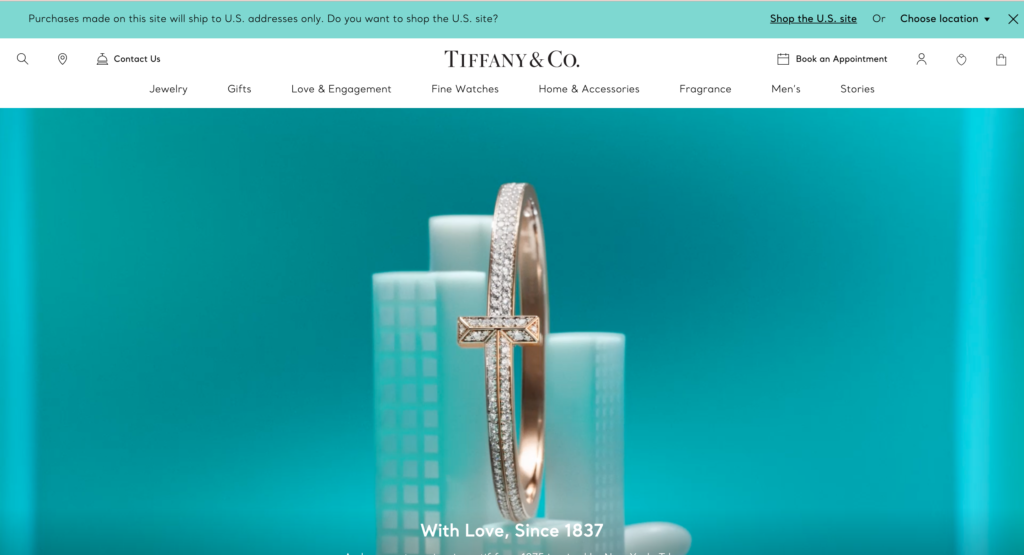
Tiffany & Co. (https://www.tiffany.com/) is a globally recognized luxury jewelry brand celebrated for its iconic designs and impeccable craftsmanship. Established in 1837, Tiffany & Co. has set the standard for elegance and sophistication, offering a stunning array of diamond engagement rings, fine jewelry, and timeless accessories. With a legacy of over 180 years, Tiffany & Co. continues to captivate customers worldwide with its commitment to quality, innovation, and enduring style.
In 2020, Tiffany & Co. experienced a significant 15% increase in online sales [Tiffany & Co. Annual Report 2020, Tiffany & Co. Press Releases ] a testament to the power of e-commerce. The brand, renowned for its luxury and elegance, adapted swiftly to the challenges posed by the COVID-19 pandemic by enhancing its digital presence.
Key Strategies:
- Enhanced User Experience: Tiffany & Co. revamped its website to provide a seamless shopping experience. High-quality images, detailed product descriptions, and intuitive navigation made online shopping as delightful as visiting a physical store.
- Virtual Consultations: Introducing virtual consultations allowed customers to receive personalized assistance from the comfort of their homes, bridging the gap between online and offline experiences.
- Mobile App Improvement: The company also focused on its mobile app, ensuring that users could easily browse and purchase items on their smartphones.
These strategic initiatives not only boosted sales but also reinforced Tiffany & Co.’s reputation as a leader in luxury retail.
Additional Benefits of having a eCommerce platform
Implementing an e-commerce solution provides several additional benefits beyond sales growth for diamond jewelry sellers like Tiffany & Co., Cartier, De Beers, and Blue Nile. Here are some of the key advantages:
1. Broader Market Reach

By establishing an online presence, jewelry brands can reach a global audience. This significantly expands their customer base beyond the limitations of physical store locations.
2. 24/7 Availability

An e-commerce website operates around the clock, allowing customers to shop at their convenience, irrespective of time zones. This increases potential sales and enhances customer satisfaction by providing a flexible shopping experience.
3. Personalized Shopping Experience

With advanced e-commerce tools and data analytics, brands can offer personalized recommendations and tailored marketing messages based on customer behavior and preferences. This enhances the shopping experience and boosts customer loyalty.
4. Lower Operational Costs

Running an e-commerce store can be more cost-effective than maintaining multiple physical stores. Savings on rent, utilities, and staffing can be significant, allowing brands to allocate resources more efficiently.
5. Enhanced Customer Insights

E-commerce platforms provide valuable data on customer behavior, preferences, and buying patterns. Brands can leverage this information to refine their marketing strategies, optimize inventory, and improve product offerings.
6. Improved Inventory Management

With integrated e-commerce solutions, brands can manage inventory more efficiently. Real-time tracking of stock levels helps prevent overstocking or stockouts, ensuring better availability of products for customers.
7. Scalability

E-commerce platforms allow brands to scale operations quickly and efficiently. Whether adding new product lines or expanding to new markets, the digital infrastructure supports growth without the constraints of physical space.
8. Enhanced Marketing Opportunities

Digital marketing tools enable precise targeting and effective campaigns across various channels such as social media, email, and search engines. This drives more traffic to the website and increases conversion rates.
9. Seamless Omni channel Experience
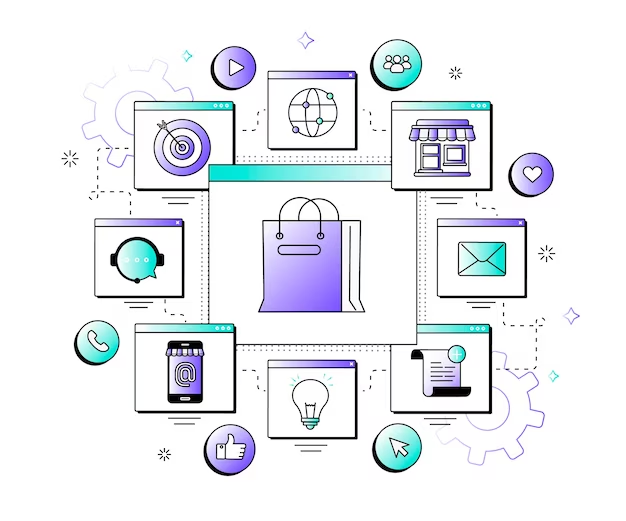
Integrating online and offline channels creates a seamless shopping experience for customers. Features like buy online, pick up in-store (BOPIS) or returns via physical stores enhance convenience.
10. Increased Brand Visibility

A strong online presence enhances brand visibility and reputation. High-quality content, customer reviews, and social media engagement contribute to a stronger brand image.
Conclusion: Embracing the Digital Future
In today’s dynamic retail landscape, the diamond jewellery industry is undergoing a transformative shift towards digital commerce, making e-commerce essential for sustainable growth and success. Prestigious brands like Tiffany & Co., Cartier, De Beers, and Blue Nile have demonstrated the significant impact of e-commerce by leveraging digital platforms to drive substantial sales growth and business expansion. For diamond jewellery business owners looking to harness the power of digital transformation, xCommerz offers a tailored e-commerce solution that provides seamless online transactions, personalized customer experiences, and unparalleled growth opportunities. Discover how xCommerz can elevate your business by visiting xcommerz.com.


